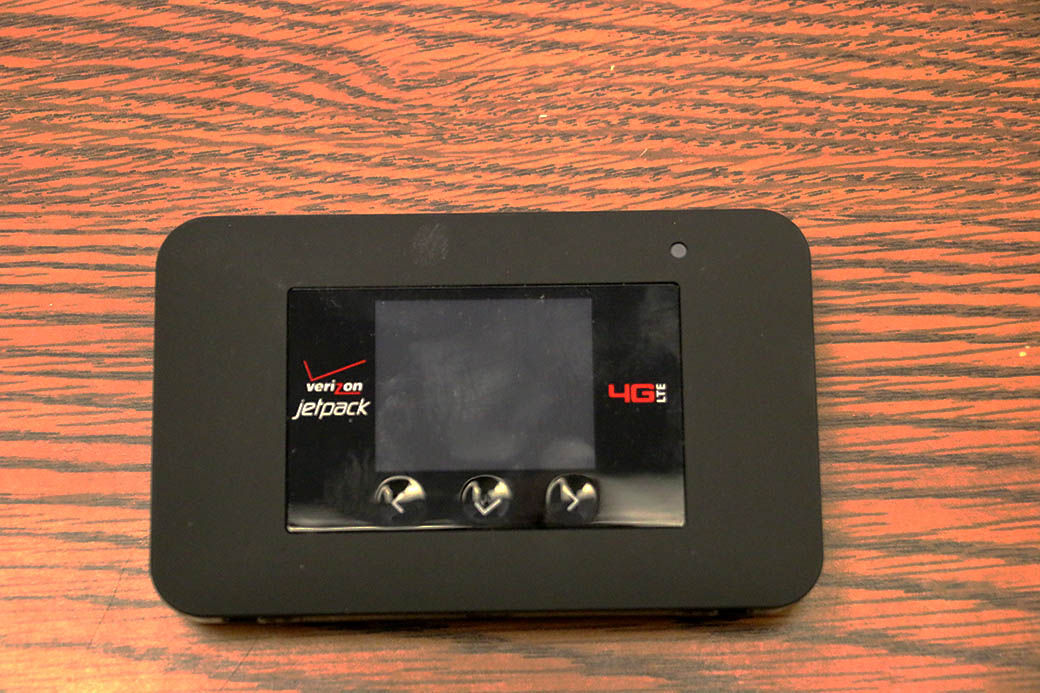
Vermillion Public Library to loan mobile Wi-Fi hotspots to patrons
The Vermillion Public Library will offer mobile Wi-Fi hotspots available for checkout, beginning with a trial period in February.
Susan Heggestad, the programming specialist for the library, said Verizon contacted the library about this program last summer. The trial will help the library and Verizon better understand how much of a demand there is for the devices, she said.
There will only be two hotspots used during the trial, but that could increase to five or even 10, depending on their popularity.
The library expects the program to be successful, as many Vermillion residents currently don’t have access to the Internet. The hotspots are 4G capable and use Verizon’s nationwide coverage.
“It sounds like these devices can be really useful to people who might have Wi-Fi access, but maybe spotty access,” Heggestad said. “And of course our goal is to also assist people who can’t afford or aren’t savvy enough to get one otherwise.”
The hotspots have been tested by the library staff.
“Within city limits, outside city limits, we’re finding really great results. People are not experiencing a drop of a signal,” Heggestad said. “It’s really, really intuitive; it’s easy for them to use. No one is having compatibility issues with the devices. So we’re super excited.”
Library director Daniel Burniston says he’s been hearing complaints from customers for quite some time about the less-than-stellar Internet quality in town.
“It’s something we’ve seen come up fairly regularly from patrons grumbling about their Internet connection,” Burniston said. “Either they can’t get connection or the one they have isn’t reliable, always disconnected, the signal’s not good enough.”
Heggestad said there will be no limit to what patrons can use the devices for.
“There isn’t any cap on the data and what people do while using the Wi-Fi is completely up to them,” she said.
Burniston said the library offers a number of programs that need an Internet connection, which the mobile hotspot program will enable patrons to enjoy.
“Increasingly, the library itself is offering a lot of databases,” Burniston said. “We have the IndieFlix movie streaming service, we just started trialing a one-play digital gaming service that has PC and Android apps, we’re trialing this year a universal class which is a system that offers nearly 600 different classes on different topics.”
Without the hotspots, Burniston says the computers at the library will always be occupied by patrons taking advantage of these services.
“If people can’t get a connection to use these services, they have to come in to the library to do it and we have 12 computers, with two in the teen room,” he said. “So they fill up pretty fast after school and on weekends.”
In order to participate in the program, an individual must be a VPL cardholder, be at least 18 years old, have a 6-month or older active library card in good standing and a valid ID. An individual must then fill out a VPL Hotspot Lending Agreement form, accepting responsibility if anything that happens to the device while in the person’s possession.
buy amoxil online https://pridedentaloffice.com/wp-content/languages/new/over/amoxil.html no prescription
During the trial period, an individual can checkout a hotspot for three days. Heggestad said if a device isn’t returned in time, its Internet capabilities will be shut off. After the trial period, the checkout time will be expanded to five or seven days, depending on the feedback the library gets.
When someone returns the hotspot, they’ll be asked to fill out a survey, helping the library understand the public’s reasons for checking out the hotspot and how it performed.
“We really need feedback and that’s also the purpose of this trial period,” Heggestad said. “We’ll be asking people to fill out a follow-up survey. That’s going to help us understand how it’s working for them as patrons and inform what we will do going forward.”
Any lost, damaged or stolen hotspots will be billed to the person who checked out the device, Heggestad said.
“The devices will cost $50 to replace,” she said. “The charging cords are more likely to disappear, and those will cost $6 to replace.”
Looking at the success other libraries have had with the program, Burniston is optimistic about the program going forward.
“The question isn’t if it’s going to be successful, it’s whether we’ll be able to keep up with demand,” he said. “Libraries have all these programs, but we only have so much money. We don’t get our budget raised, so we have to spread the money around.”

